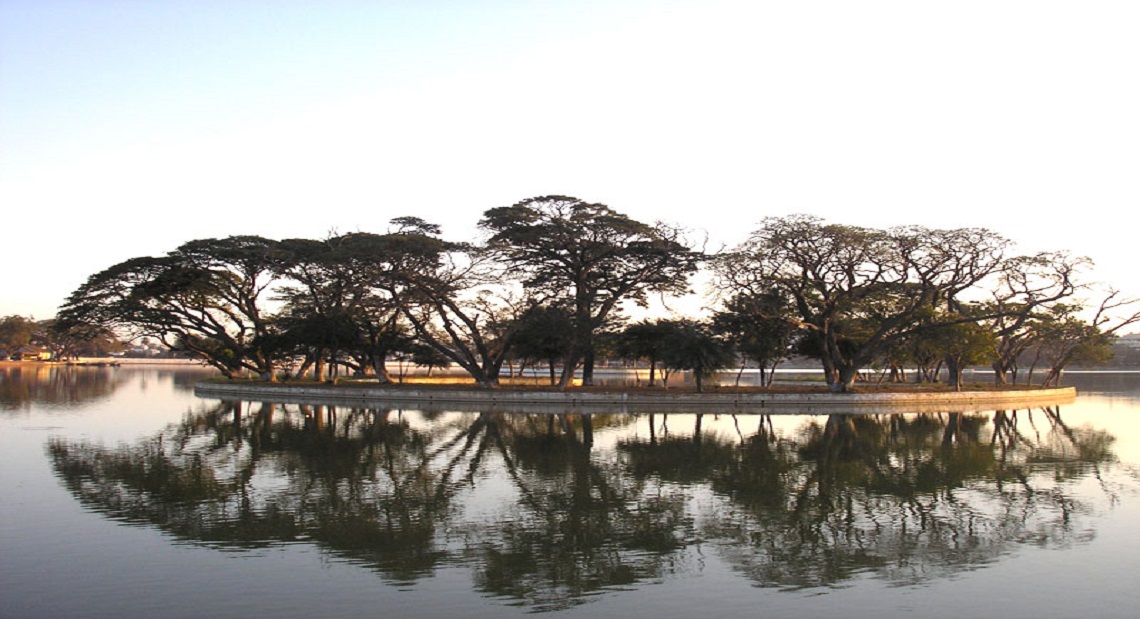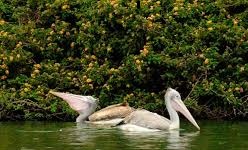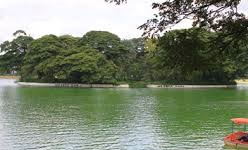The Mahadevapura lake,located next to Outer Ring Road and adjacent to Bagmane Tech Park is under the custody of BBMP.This lake is part of the Varthur lake series that drains southward to its downstream Doddanekundi lake.
According to water quality report released by Karnataka State Pollution Control Board(KSPCB) in the year 2011,the lakes was listed under Category D which made it conducive only for the propagation of wildlife and fisheries.As the area around it developed the water is the lake completely dried up and much later become a natural sewage deposition node for the area.
Mahadevapura Lake has been rejuvenated jointly by the government,corporates,community and national and international not for profits.This mlti-stakeholder group ensured that the solutions proposed were contextual and close to nature's way of functioning.The choice of solution has also been made keeping sustainability in focus.The treatment system,a! MLD DEWATS coupled with a well designed diversion structure has introduced a fresh perspective to the whole space of lake rejuvenation.
-
Total
26 Acres (1,05,218sqm)
Area -
Total Water Spread Area
19 Acres (76,890.3sqm) -
Average Depth Of Lake
11.4 feet
(3.5mt)
Key Interventions at Mahadevpura Lakes
Interventions
- desilting the lake area
- construction of primary wastewater diversion channel
- creation and restoration of bund
- creation of silt basin
- construction of box culvert at inlets
- waste weir construction
- walking path created
- island construction
Interventions
- construction of an 85m long earthen drain for channelizing water from inlet-3 into the STP
- a 1MLD STP of DEWATS approach
- grabions for distribution of water flow
- floating wetlands
Interventions
- Plantation Of Native Plant Species
Interventions
- Creation of walking pathway
- Placement of seating structures and dustbins for disposal of solid waste
1 MLD DEWATS Sewage Treatment Plant
A 1 MLD DEWATS based wastewater treatment plant has been constructed to treat the incoming wastewater. Tertiary treated wastewater is used to fill the lake. The following schematic shows the primary, secondary & tertiary treatment modules.
- Intake Structure -
Upstream Diversion Structure with 2 stages of screening - Primary treatment -
Diversion Channel with 2 stages of screening,
Sedimentation tank and Balancing tank with pump arrangements. - Secondary treatment -
DEWATS (ABR + AF) - Tertiary treatment -
Gabions followed by floating wetlands
Lakes Water Quality
| Parameter | P1 Upstream drain |
P2 Garudachar-play Inlet |
P3 Anaerabic Filter Outlet |
P4 Anaerabic Filter Outlet |
P5 Gabions Outlet |
P6 Lake sample |
|---|---|---|---|---|---|---|
| PH | 7.1 | 7.6 | 7.2 | 7.4 | 7.6 | 9.1 |
| Temperature | 25.4 | 25.3 | 25.2 | 25 | 25 | 24.8 |
| Electrical Conductivity (us/cm) | 1499 | 1161 | 1492 | 1427 | 1416 | 972 |
| Total Dissolved Solids (mg/L) | 692 | 525 | 673 | 650 | 644 | 429 |
| TSS (mg/L) | 385 | 294 | 395 | 105 | 61 | 60 |
| BOD3 (mg/L) | 470 | 270 | 460 | 70 | 50 | 15 |
| COD(mg/L)/td> | 737 | 476 | 709 | 175 | 130 | 122 |
| Po4-3(mg/L) | 14 | 12 | 12.7 | 19.8 | 16.3 | 7.7 |
| NH4-N(mg/L) | 20.3 | 30.4 | 22.4 | 41.2 | 36.6 | 2 |
Decentralised Wastewater Treatment System (DEWATS)
The primary focus for DEWATS is a decentralised approaches, Quilding any treat wastewater close to the point of generation enabling water to be effectively used use of natural bacteria, plants and gravity instead of electricity and chemicals, is easy to integrate Aesthetically into built environments and is adaptable to a variety of wastewater characteristics
DEWATS consists of Settler, Anaerobic Baffled Reactors (ABRI), Anaerobic Filters(AF) and Planted Gravel Filter (PGF)
- Settler-
The Settler acts as a Sedimentation tank that retains most of the Settleable orgnic matter and scum and decomposes some of it through anaerobic digestion. - Anaerobic Baffled reactor (ABR) -
ABR degrades suspended and dissolved solids anaerobically through a naturally occurring active sludge blanket. - Anaerobic Filter (AF) -
AF acts as a fixed bed filter where wastewater is brought into close contact with active bacteria for removal of dissolved organic matter. - Planted Gravel Filter (PGF) -
PGF is a shallow tank with plantation that can be used to treat remaining pollutants by biological conversion ,mechanical filtration and chemical adsorption







